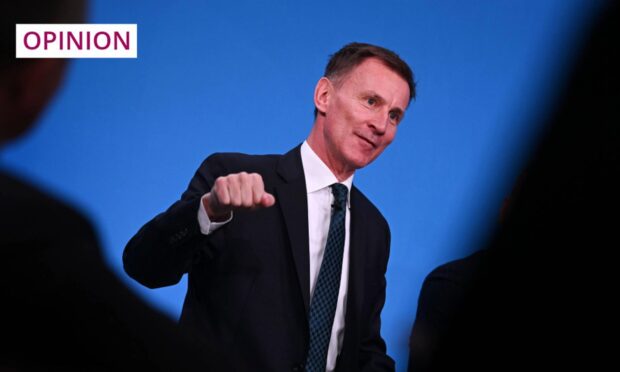Who doesn’t like a tax cut? Precious few of us.
Or so reckons Tory chancellor Jeremy Hunt who, in the run-up to his March budget, has been dropping hints of just such cuts at every opportunity.
By leaving us with a pound or two he’d otherwise have taken away, Mr Hunt hopes, he’ll persuade us that he and his party, presently languishing in the polls, are, after all, deserving of our votes.
Maybe that’ll work. Maybe it won’t. But, either way, there’s bound eventually to be a price to be paid for the resulting shrinkage of the public purse.
That price will take the form, as it invariably does, of still more cuts to the sort of public services on which we all rely.
A politician promising to take a bit less of our money is guaranteed an easy cheer from his own party. So, plenty of such cheers are likely to come Jeremy Hunt’s way on next month’s budget day.
Just as there were equally resounding cheers at last October’s SNP conference in Aberdeen when Humza Yousaf, Scotland’s first minister, announced that there will be no increase this year in the council taxes levied by Scottish local authorities.
“We’re living in a cost-of-living crisis,” said Mr Yousaf. “Therefore, it is right that we try to help with bills that are rising and rising. One bill we are able to help with is the council tax.”
And councils needn’t worry that they’re being short changed, Mr Yousaf insisted, because the cash they’d have got from raising council tax will come instead from Holyrood.
Well, perhaps. But even if the council tax shortfall is made good, that will cost the Scottish Government some £300 million. Possibly more.
Where is the money going to come from?
Where’s this amount to be got? It can’t come from borrowing – Holyrood, for better or worse, having no borrowing powers.
So, other expenditure will have to be squeezed. Which means that already hard-pressed hospitals, the police or other public services will be left with even fewer resources than they might otherwise have had.
Tax cuts, then, are seldom if ever pain-free, whoever makes them.
When that tomorrow gets here, which won’t take very long, Jeremy Hunt or his successor will have just two options
Unlike Mr Yousaf, Mr Hunt – being able to cover any short-run lack of revenue by virtue of drawing a little more heavily on the borrowings that are a permanent feature of Whitehall accounting – can have tax cuts today while deferring consequent reductions in government spending to a post-election tomorrow.
But when that tomorrow gets here, which won’t take very long, Jeremy Hunt or his successor – and that successor could well be his Labour shadow Rachel Reeves – will have just two options.
To reverse the tax cuts Mr Hunt and his colleagues are now more or less promising. Or to opt for yet another round of the so-called austerity that’s left so many of us feeling, with good reason, that Britain has become a country where nothing any longer works as it once did.
Governments have to spend more, not less
Tax cuts might be nice. But arguably still nicer would be politicians who levelled with us on the budgetary implications of the inescapable fact that UK governments are, for all sorts of reasons, going to have to spend more, not less, money in the years ahead.
Previous bouts of austerity have left us with crumbling roads, chronic housing shortages, a busted social care system, a grossly overstretched health service, and the many other all-too-obvious consequences of our having failed to make investments that were dodged or deferred.
Sooner or later, something is going to have to be done to put right what’s thus been permitted to go so very badly wrong. And, even if that doesn’t happen, all sorts of other spending pressures are either here already or are coming hurtling down the track.
Pressures arising from this becoming a country with more and more elderly people. Pressures having to do with the various measures – ranging from a reconfigured national grid, by way of improved flood prevention, to wholesale home insulation – made essential by a climate crisis that’s getting yearly more acute.
Pressures stemming from the evermore unavoidable need for us to be expanding, not shrinking as we have been doing, our defence capabilities.
We need honesty
Politicians on all sides seem to have convinced themselves that we can’t cope with truths like these.
Maybe they’re right. Maybe there aren’t any votes in making clear that if we’re going to have a more liveable, more secure and more civilised country, someone’s going to have to meet the necessary bills. This someone being all of us. By way of taxes.
Perhaps that wouldn’t be a cheering message. But it would be an honest one. A lot more honest than the notion that council-tax freezes and giveaway budgets are cost-free ways of boosting our prospects.
They aren’t. They’re just so much chicanery.
Jim Hunter is a historian, award-winning author and Emeritus Professor of History at the University of the Highlands and Islands



Conversation